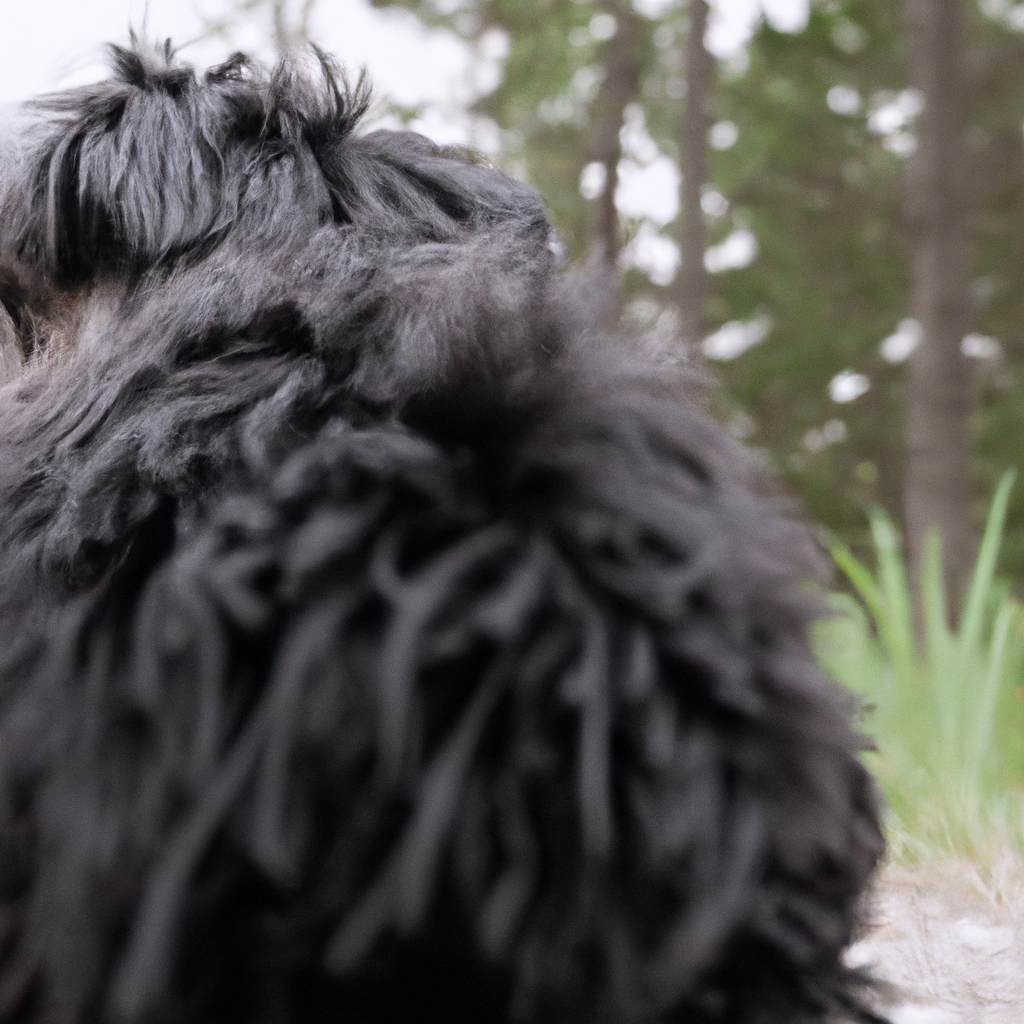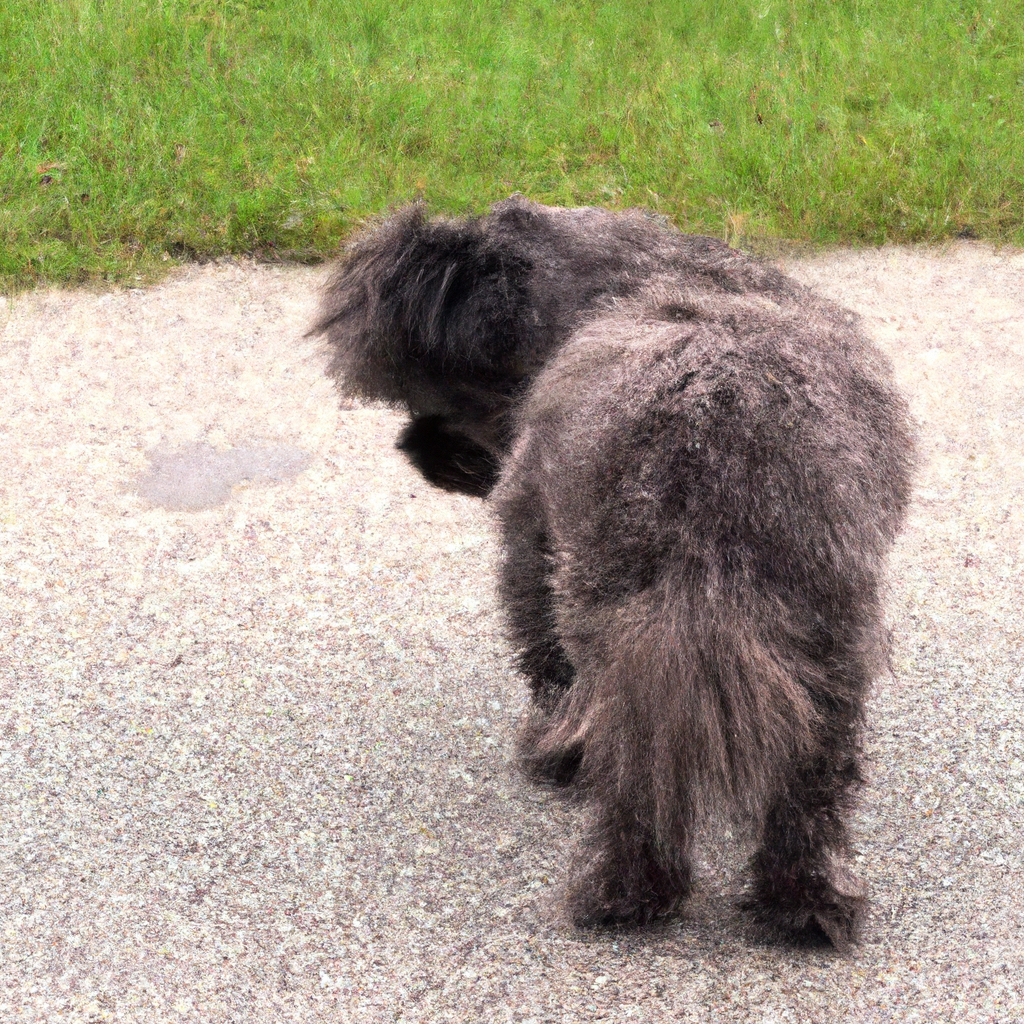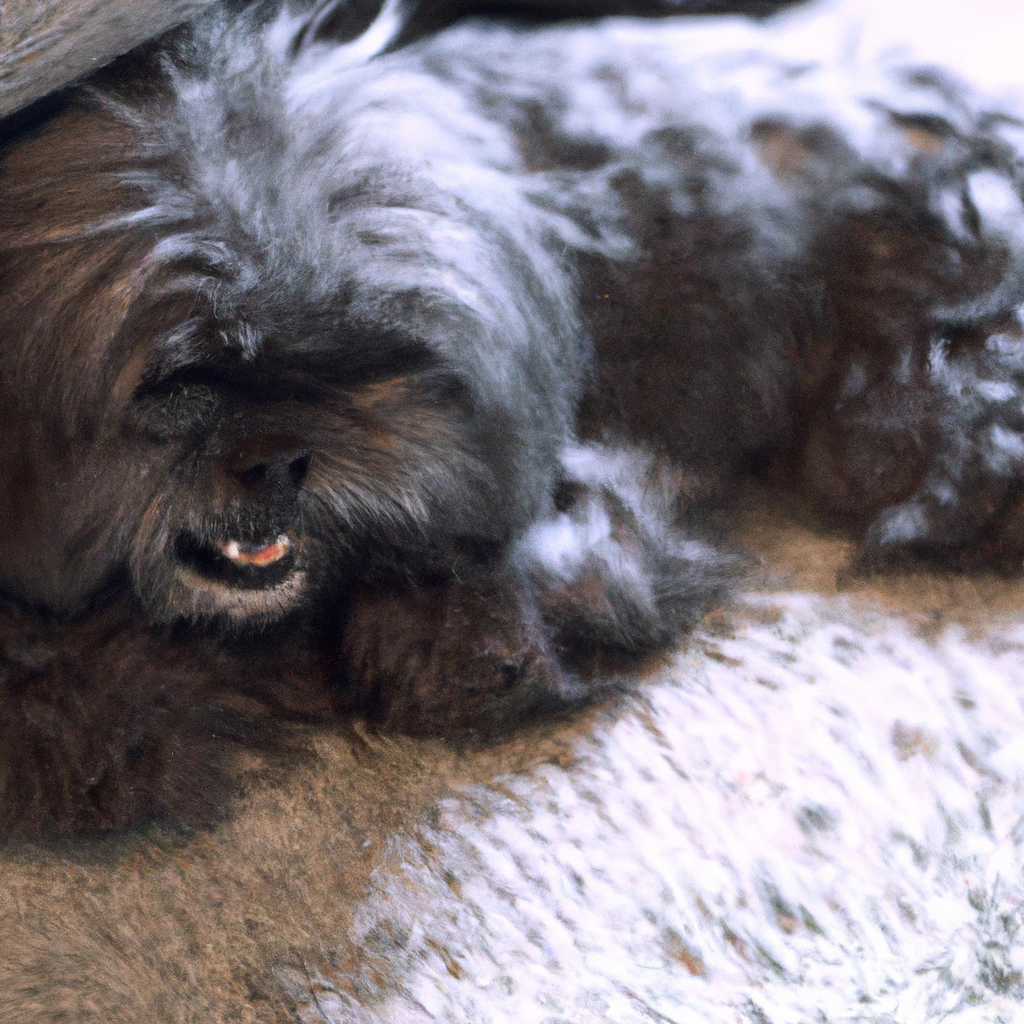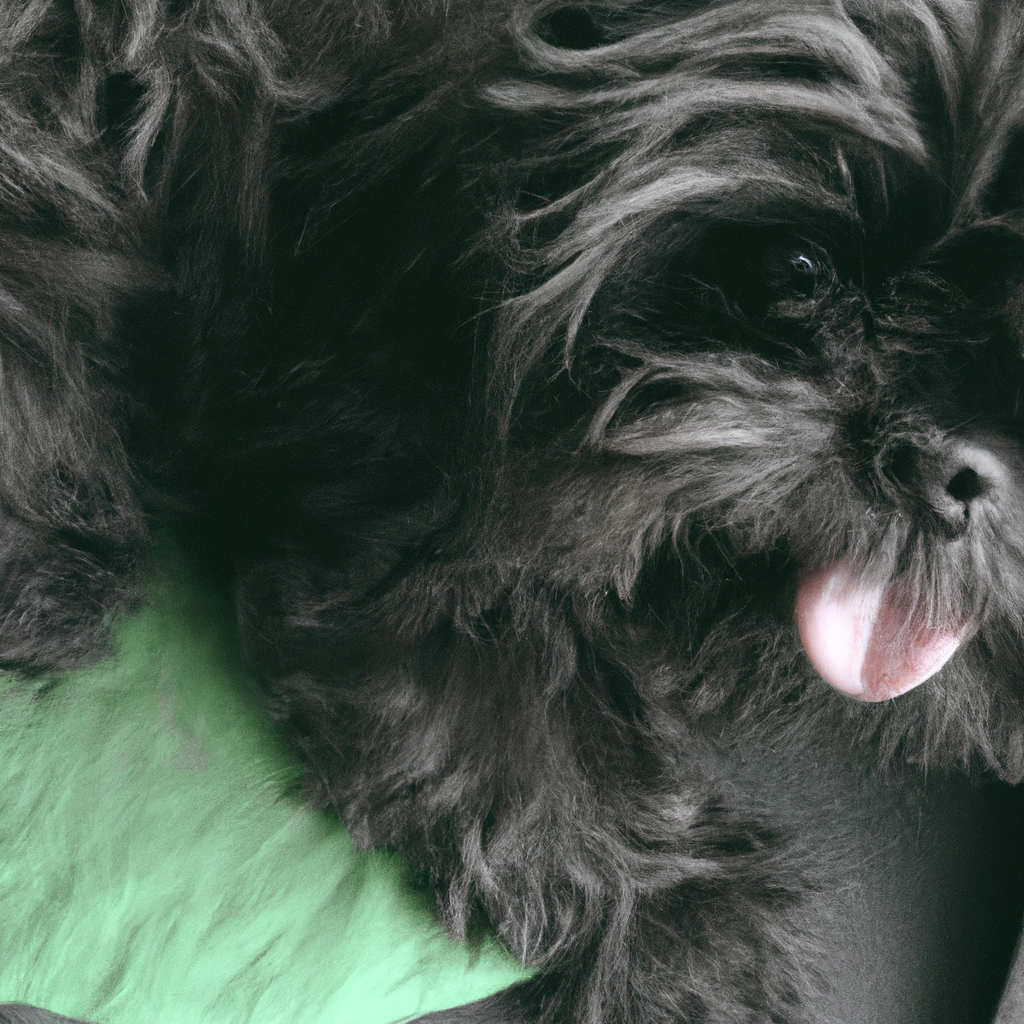Identifying behavioral troubles in Affenpinschers involves understanding and recognizing abnormal behaviors in this specific breed of dog. Affenpinschers, also known as “Monkey Terriers,” are generally known for their bold and funny personalities. However, like any breed, they can develop behavioral issues due to various factors such as genetics, environment, or lack of training. These issues can manifest as aggression, excessive barking, separation anxiety, or other forms of disruptive behavior. Understanding these potential problems is crucial for owners to ensure the well-being of their Affenpinscher and to provide appropriate interventions or training when necessary.
Recognizing Aggression in Affenpinschers: A Comprehensive Guide
Affenpinschers, also known as “Monkey Terriers,” are small but mighty dogs known for their distinctive appearance and lively personality. However, like any breed, they can sometimes exhibit behavioral troubles, particularly aggression. Recognizing aggression in Affenpinschers is crucial for their well-being and the safety of those around them. This comprehensive guide will help you identify and understand these behavioral issues.
Affenpinschers are generally friendly and sociable dogs, but they can become aggressive if they feel threatened or anxious. This aggression can manifest in various ways, such as growling, baring teeth, snapping, or even biting. It’s important to remember that aggression is often a response to fear or discomfort, so it’s crucial to identify the triggers that may be causing your Affenpinscher to act out.
One common trigger for aggression in Affenpinschers is resource guarding. This breed can be possessive over food, toys, or even their favorite human. If your Affenpinscher growls or snaps when you approach their food bowl or try to take away a toy, they may be exhibiting signs of resource guarding. It’s essential to address this behavior early on to prevent it from escalating.
Another potential trigger for aggression in Affenpinschers is unfamiliar situations or environments. These dogs are known for their bold and fearless nature, but they can also be sensitive and anxious in new or stressful situations. If your Affenpinscher becomes aggressive when meeting new people or visiting unfamiliar places, it may be a sign that they’re feeling overwhelmed.
Affenpinschers can also become aggressive if they’re not getting enough physical and mental stimulation. These dogs are energetic and intelligent, and they need regular exercise and mental challenges to keep them happy and healthy. If your Affenpinscher is acting out, it could be a sign that they’re bored or frustrated.
It’s also worth noting that some Affenpinschers may become aggressive due to underlying health issues. Pain or discomfort can cause a dog to become irritable and defensive. If your Affenpinscher’s aggression is sudden or unexplained, it’s a good idea to consult with a vet to rule out any potential health problems.
Once you’ve identified the triggers for your Affenpinscher’s aggression, you can start working on a plan to address these issues. This might involve training techniques to help your dog feel more secure and comfortable, changes to their environment or routine to reduce stress, or even medical treatment if there’s an underlying health issue.
Remember, it’s always best to consult with a professional dog trainer or behaviorist if you’re dealing with aggression in your Affenpinscher. They can provide expert guidance and support to help you and your dog navigate these challenges.
In conclusion, recognizing aggression in Affenpinschers involves understanding their behavior, identifying potential triggers, and seeking professional help when needed. With patience, understanding, and the right approach, you can help your Affenpinscher overcome their behavioral troubles and enjoy a happy, healthy life.
Understanding Anxiety Disorders in Affenpinschers
Affenpinschers, often referred to as “Monkey Terriers” due to their distinct primate-like appearance, are small but incredibly spirited dogs. They are known for their playful and adventurous nature, but like any other breed, they are not immune to behavioral troubles. One of the most common issues that Affenpinschers face is anxiety disorders. Understanding these disorders and identifying their signs is crucial for any Affenpinscher owner, as it can significantly impact the quality of life of these adorable little creatures.
Anxiety in Affenpinschers, as in other breeds, can manifest in various ways. It’s not always easy to identify, especially for first-time dog owners. However, there are certain signs that can indicate your Affenpinscher might be dealing with anxiety. These signs can range from subtle changes in behavior to more obvious symptoms.
One of the most common signs of anxiety in Affenpinschers is a change in their eating habits. If your Affenpinscher is eating less than usual or showing a lack of interest in food, it could be a sign of anxiety. Similarly, changes in sleep patterns can also indicate anxiety. If your Affenpinscher is sleeping more than usual or seems restless during the night, it might be worth consulting with a vet.
Another common sign of anxiety in Affenpinschers is excessive barking or whining. While these dogs are known for their vocal nature, excessive noise can be a sign of distress. Similarly, if your Affenpinscher is showing signs of aggression or fear towards people or other animals, it could be a sign of anxiety.
Physical symptoms can also indicate anxiety in Affenpinschers. These can include excessive panting, drooling, or shaking. In some cases, Affenpinschers might also show signs of compulsive behavior, such as excessive licking or chewing on their paws. These behaviors can be a way for them to cope with their anxiety.
It’s important to remember that these signs can also be symptoms of other health issues. Therefore, if you notice any of these behaviors in your Affenpinscher, it’s crucial to consult with a vet. They can help determine whether these behaviors are due to anxiety or if there’s another underlying health issue.
If your vet confirms that your Affenpinscher is dealing with anxiety, there are several ways to help them cope. One of the most effective ways is through behavior modification training. This involves teaching your Affenpinscher to associate positive experiences with situations that might cause them anxiety. For example, if your Affenpinscher gets anxious when left alone, you can start by leaving them alone for short periods and gradually increase the duration.
Another effective way to manage anxiety in Affenpinschers is through medication. There are several types of medication available that can help reduce anxiety in dogs. However, medication should always be used in conjunction with behavior modification training and under the supervision of a vet.
In conclusion, anxiety disorders in Affenpinschers can manifest in various ways, from changes in eating and sleeping habits to excessive barking and physical symptoms. If you notice any of these signs in your Affenpinscher, it’s crucial to consult with a vet. With the right approach, including behavior modification training and possibly medication, you can help your Affenpinscher manage their anxiety and lead a happy and healthy life.
Identifying Signs of Depression in Affenpinschers
Affenpinschers, often referred to as “Monkey Dogs” due to their distinct facial features, are a small breed of dog known for their playful and adventurous nature. However, like humans, these little creatures can also experience emotional distress, including depression. Identifying signs of depression in Affenpinschers is crucial for their overall well-being and happiness.
Depression in dogs is not as uncommon as one might think. It can be triggered by various factors, such as a significant change in their routine, the loss of a companion, or a traumatic event. Affenpinschers, being a sensitive breed, are particularly susceptible to such emotional disturbances.
One of the most common signs of depression in Affenpinschers is a noticeable change in their behavior. If your usually energetic and playful Affenpinscher suddenly becomes lethargic and uninterested in activities they once enjoyed, it could be a sign of depression. They may also lose interest in their favorite toys or treats, and may not respond to your attempts to engage them in play.
Another sign to look out for is a change in their eating habits. Affenpinschers suffering from depression may either eat less or more than usual. A sudden loss of appetite or an unusual increase in food consumption can be indicative of emotional distress. Similarly, changes in sleeping patterns can also be a sign of depression. If your Affenpinscher is sleeping more than usual or seems restless during the night, it could be a symptom of depression.
A depressed Affenpinscher may also exhibit signs of anxiety. They may become more clingy and seek constant attention, or they may withdraw and prefer to be alone. They may also show signs of nervousness, such as pacing, excessive licking or chewing, or unexplained aggression.
It’s important to remember that these signs can also be indicative of physical health issues. Therefore, if you notice any of these changes in your Affenpinscher, it’s crucial to consult with a veterinarian to rule out any underlying medical conditions.
If your vet confirms that your Affenpinscher is indeed suffering from depression, there are several steps you can take to help them. Providing them with plenty of love and attention can go a long way in making them feel secure and loved. Regular exercise and playtime can also help boost their mood and energy levels. In some cases, your vet may recommend medication or behavioral therapy to help manage their depression.
In conclusion, depression in Affenpinschers, like in any other breed, is a serious condition that requires immediate attention. By being observant and responsive to changes in your Affenpinscher’s behavior, eating habits, and sleeping patterns, you can identify signs of depression early and take the necessary steps to help them. Remember, your Affenpinscher’s emotional health is just as important as their physical health. So, don’t hesitate to seek professional help if you suspect your furry friend is feeling blue. After all, a happy Affenpinscher is a healthy Affenpinscher.
Affenpinschers and Separation Anxiety: What You Need to Know
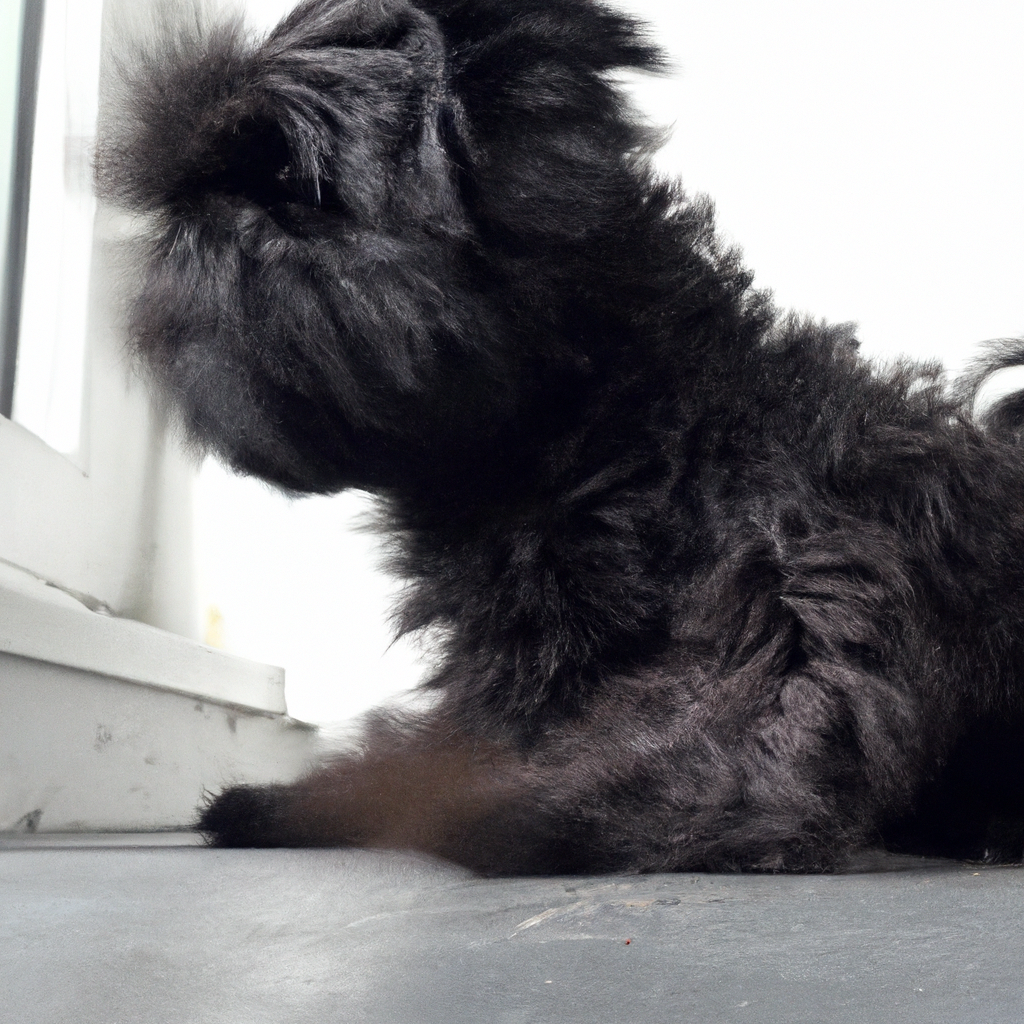
Affenpinschers, often referred to as “Monkey Terriers” due to their distinct primate-like appearance and playful nature, are a small breed of dog that are known for their loyalty, intelligence, and spirited personality. However, like any breed, Affenpinschers can experience behavioral troubles, one of the most common being separation anxiety. Understanding this condition and how it manifests in your Affenpinscher is crucial to ensuring their overall well-being and happiness.
Separation anxiety in Affenpinschers, as in other breeds, is a distressing condition that occurs when the dog becomes overly attached to its owner and experiences extreme stress when left alone. This anxiety can manifest in various ways, including excessive barking, destructive behavior, and even attempts to escape. It’s important to note that these behaviors are not a sign of disobedience or spite, but rather a cry for help from a pet that is struggling to cope with their anxiety.
Identifying separation anxiety in your Affenpinscher can be challenging, as the symptoms can often be mistaken for general misbehavior. However, there are certain signs that can indicate your pet is suffering from this condition. For instance, if your Affenpinscher becomes overly anxious or agitated when you’re preparing to leave the house, or if they exhibit destructive behavior only when you’re away, these could be signs of separation anxiety.
Another common symptom is inappropriate elimination. If your normally house-trained Affenpinscher starts having accidents in the house when you’re not there, it could be a sign of separation anxiety. Similarly, excessive barking or howling, especially if it only occurs when you’re away, can also be indicative of this condition.
Once you’ve identified that your Affenpinscher may be suffering from separation anxiety, it’s important to take steps to help them manage their stress. One effective method is to create a safe space for your pet where they can feel secure when you’re not around. This could be a specific room in your house or a crate that they associate with positive experiences.
Another strategy is to gradually acclimate your Affenpinscher to your absence. Start by leaving them alone for short periods of time, gradually increasing the duration as they become more comfortable. It can also be helpful to establish a routine before you leave, such as a walk or playtime, to help them associate your departure with positive experiences.
In some cases, professional help may be necessary. A certified animal behaviorist or a veterinarian can provide valuable insight into managing your pet’s anxiety and can offer solutions tailored to your Affenpinscher’s specific needs.
Remember, it’s crucial to approach your Affenpinscher’s separation anxiety with patience and understanding. Punishing your pet for their anxiety-related behaviors will only exacerbate the problem. Instead, focus on creating a secure, positive environment and providing them with the support they need to manage their stress.
In conclusion, while Affenpinschers are a delightful breed known for their loyalty and spirited personality, they can suffer from separation anxiety. Recognizing the signs of this condition and taking steps to alleviate their stress can ensure your Affenpinscher remains a happy and healthy member of your family.
Spotting Obsessive Compulsive Behaviors in Affenpinschers
Affenpinschers, also known as “Monkey Terriers,” are small but mighty dogs known for their distinctive appearance and playful, energetic personalities. However, like any breed, Affenpinschers can sometimes exhibit behavioral troubles that may be cause for concern. One such issue that can arise is obsessive-compulsive behavior. This can manifest in a variety of ways, and it’s important for owners to be able to identify these signs to ensure their furry friend’s well-being.
Obsessive-compulsive behaviors in dogs are repetitive, ritualistic actions that can range from harmless quirks to disruptive or even harmful habits. In Affenpinschers, these behaviors might include excessive grooming, constant tail chasing, or an unending fixation on certain toys or objects. While it’s normal for dogs to have favorite toys or enjoy a good tail chase now and then, when these behaviors become incessant, it could indicate a deeper issue.
One of the first signs of obsessive-compulsive behavior in Affenpinschers is a sudden change in their normal routine or behavior. For instance, if your usually playful and social Affenpinscher suddenly becomes withdrawn and spends hours fixated on a single activity, it’s time to take note. Similarly, if your dog starts to ignore meals or shows signs of distress when unable to perform their ritualistic behavior, it’s a clear indication that something is amiss.
Another sign to watch out for is if your Affenpinscher starts to engage in these behaviors for longer periods. A dog chasing its tail for a few minutes is not a cause for concern. However, if your Affenpinscher is spending hours chasing its tail, ignoring other activities, and even causing harm to itself, it’s a sign of obsessive-compulsive behavior.
It’s also important to note that obsessive-compulsive behaviors can often be triggered by stress or anxiety. Changes in the household, such as a new pet or a move, can lead to increased anxiety in your Affenpinscher, which may manifest as obsessive-compulsive behavior. If you notice your dog exhibiting these behaviors following a significant change or stressful event, it’s crucial to address the issue promptly.
So, what can you do if you identify these behaviors in your Affenpinscher? The first step is to consult with a veterinarian or a professional dog behaviorist. They can help determine if the behavior is indeed obsessive-compulsive and can provide guidance on the best course of action. This might include behavior modification techniques, environmental changes, or in some cases, medication.
In addition, providing your Affenpinscher with plenty of physical and mental stimulation can help curb obsessive behaviors. Regular exercise, interactive toys, and training sessions can help keep your dog’s mind occupied and reduce the likelihood of obsessive behaviors developing.
In conclusion, while Affenpinschers are generally happy and healthy dogs, they can sometimes exhibit signs of obsessive-compulsive behavior. By being aware of these signs and knowing how to respond, you can ensure that your Affenpinscher remains not only physically healthy but mentally healthy as well. Remember, early detection and intervention are key to managing these behaviors and ensuring your Affenpinscher’s overall well-being.
The Impact of Fear and Phobias on Affenpinschers’ Behavior
Affenpinschers, often referred to as “Monkey Terriers” due to their distinct primate-like appearance, are small but sturdy dogs known for their playful and confident demeanor. However, like any other breed, Affenpinschers can also exhibit behavioral troubles, often stemming from fear and phobias. Understanding these issues is crucial for pet owners to ensure their furry friends lead a happy and healthy life.
Fear is a natural response to a perceived threat, and it’s not uncommon for dogs to experience it. However, when fear becomes persistent and irrational, it can escalate into a phobia. In Affenpinschers, these fears and phobias can manifest in various ways, such as aggression, excessive barking, or even destructive behavior.
One of the most common fears in Affenpinschers is separation anxiety. These dogs are known for their strong attachment to their owners, and being left alone can cause them significant distress. This can lead to behaviors such as excessive barking, chewing on furniture, or even attempts to escape. It’s important to recognize these signs early and take steps to alleviate your pet’s anxiety. This could involve gradually increasing the time your pet spends alone, or providing them with toys and activities to keep them occupied.
Another common fear in Affenpinschers is the fear of loud noises. This can include thunderstorms, fireworks, or even the sound of vacuum cleaners. This fear can cause your pet to become extremely anxious, leading to behaviors such as hiding, shaking, or even aggression. To help your pet cope with this fear, it’s important to provide them with a safe space where they can retreat to when they’re feeling scared. You can also try to desensitize them to these noises by playing them at a low volume and gradually increasing the volume over time.
Phobias, on the other hand, are intense, irrational fears that can cause significant distress and can lead to behavioral issues if not addressed. For instance, some Affenpinschers may develop a phobia of strangers, leading to aggressive behavior whenever someone unfamiliar approaches. This can be particularly challenging to manage, as it can make socializing your pet difficult. In such cases, it may be beneficial to consult with a professional dog trainer or a behaviorist who can provide guidance on how to help your pet overcome their fear.
It’s important to remember that fear and phobias in Affenpinschers, like in any other breed, are not a sign of a ‘bad’ or ‘misbehaved’ dog. Rather, they are a response to stress or trauma, and it’s our responsibility as pet owners to help our furry friends navigate these feelings.
In conclusion, identifying behavioral troubles in Affenpinschers often involves recognizing the signs of fear and phobias. By understanding these issues and taking steps to address them, you can help your Affenpinscher lead a happier, healthier life. Remember, patience and understanding are key when dealing with a fearful or phobic dog. With time and the right approach, your Affenpinscher can learn to overcome their fears and live a more relaxed and content life.
Affenpinschers and Destructive Behavior: Causes and Solutions
Affenpinschers, often referred to as “Monkey Terriers” due to their distinct primate-like appearance, are small but mighty dogs known for their playful and adventurous nature. However, like any other breed, they can exhibit behavioral troubles that can be a cause for concern for their owners. Understanding these behaviors, their causes, and potential solutions is crucial for maintaining a harmonious relationship with your Affenpinscher.
One common behavioral issue in Affenpinschers is destructive behavior. This can manifest in various ways, such as chewing on furniture, digging holes in the yard, or tearing apart toys and other items. While it may seem like your Affenpinscher is just being naughty, destructive behavior is often a sign of underlying issues.
One of the primary causes of destructive behavior in Affenpinschers is boredom. These dogs are energetic and intelligent, requiring regular mental and physical stimulation. Without it, they may resort to destructive behavior as a way to entertain themselves. Similarly, Affenpinschers are known for their strong attachment to their owners. If left alone for extended periods, they can develop separation anxiety, another common trigger for destructive behavior.
Another potential cause is a lack of proper training. Affenpinschers are known for their stubborn streak, which can make training a challenge. However, without clear boundaries and consistent training, these dogs can develop behavioral issues, including destructive behavior.
Now that we’ve identified the potential causes, let’s move on to the solutions. The first step in addressing destructive behavior in Affenpinschers is providing them with enough physical exercise and mental stimulation. Regular walks, playtime, and puzzle toys can help keep your Affenpinscher entertained and prevent boredom. If your dog is showing signs of separation anxiety, consider hiring a pet sitter or enrolling them in a doggy daycare to ensure they’re not left alone for too long.
Training is another crucial part of the solution. Start training your Affenpinscher from a young age and be consistent with your rules and boundaries. Positive reinforcement methods, such as treats and praise, can be particularly effective with this breed. If you’re struggling with training, don’t hesitate to seek help from a professional dog trainer.
In some cases, destructive behavior can be a sign of a medical issue. If your Affenpinscher’s destructive behavior is sudden or accompanied by other concerning symptoms, it’s worth scheduling a visit to the vet. Conditions such as dental disease, arthritis, or gastrointestinal issues can cause discomfort or pain, leading your dog to act out.
In conclusion, while destructive behavior in Affenpinschers can be frustrating, it’s important to remember that it’s often a sign of an underlying issue rather than simple naughtiness. By understanding the potential causes and implementing the appropriate solutions, you can help your Affenpinscher overcome these behavioral troubles and live a happy, healthy life. Remember, patience and consistency are key when dealing with behavioral issues in dogs. With time and effort, your Affenpinscher’s behavior can improve significantly.
Excessive Barking in Affenpinschers: Identifying the Underlying Issues
Affenpinschers, also known as “Monkey Terriers,” are small but mighty dogs known for their distinctive appearance and lively personality. However, like any breed, they can sometimes exhibit behavioral issues. One of the most common problems that Affenpinscher owners face is excessive barking. While it’s natural for dogs to bark, it becomes a problem when it’s incessant and disruptive. Understanding the underlying issues behind this behavior is crucial in addressing it effectively.
Firstly, it’s important to understand that barking is a form of communication for dogs. Affenpinschers, in particular, are known for their alert and vigilant nature. They were originally bred to keep rats and other pests at bay, which explains their keen sense of alertness. So, when your Affenpinscher barks excessively, it could be trying to alert you to something it perceives as a threat. This could be anything from a stranger approaching your home to a squirrel running across your yard.
However, excessive barking can also be a sign of boredom or loneliness. Affenpinschers are social creatures that thrive on interaction and stimulation. If they’re left alone for long periods or don’t get enough physical and mental exercise, they may resort to barking as a way to entertain themselves or attract attention.
Another possible reason for excessive barking is anxiety. Affenpinschers are known to be a bit anxious, especially when they’re in unfamiliar situations or environments. They may bark excessively when they’re feeling stressed or scared as a way to express their discomfort. This is particularly common in rescue dogs or those with a history of trauma or neglect.
Health issues can also lead to excessive barking in Affenpinschers. Pain or discomfort can cause a dog to bark more than usual. If your Affenpinscher suddenly starts barking excessively, it’s a good idea to have it checked by a vet to rule out any potential health problems.
Once you’ve identified the possible reasons behind your Affenpinscher’s excessive barking, you can start addressing the issue. If boredom or loneliness is the problem, make sure your dog gets plenty of exercise and mental stimulation. This could involve daily walks, playtime, and puzzle toys. If anxiety is the issue, consider working with a professional dog trainer or behaviorist who can help your dog feel more secure and confident.
If the excessive barking is due to health issues, your vet can provide appropriate treatment. In some cases, medication may be necessary to manage pain or anxiety.
Remember, it’s important to approach the issue with patience and understanding. Punishing your dog for barking can often make the problem worse and cause additional behavioral issues. Instead, focus on positive reinforcement and reward your dog for quiet behavior.
In conclusion, excessive barking in Affenpinschers can be a sign of various underlying issues, from boredom and loneliness to anxiety and health problems. By understanding the reasons behind this behavior, you can take the necessary steps to address it effectively. With patience, consistency, and the right approach, you can help your Affenpinscher become a quieter and happier member of your family.In conclusion, identifying behavioral troubles in Affenpinschers involves observing signs such as excessive aggression, anxiety, destructive behavior, and unusual changes in their behavior. Early detection and appropriate intervention can help manage these issues effectively, ensuring the well-being of the Affenpinscher.
